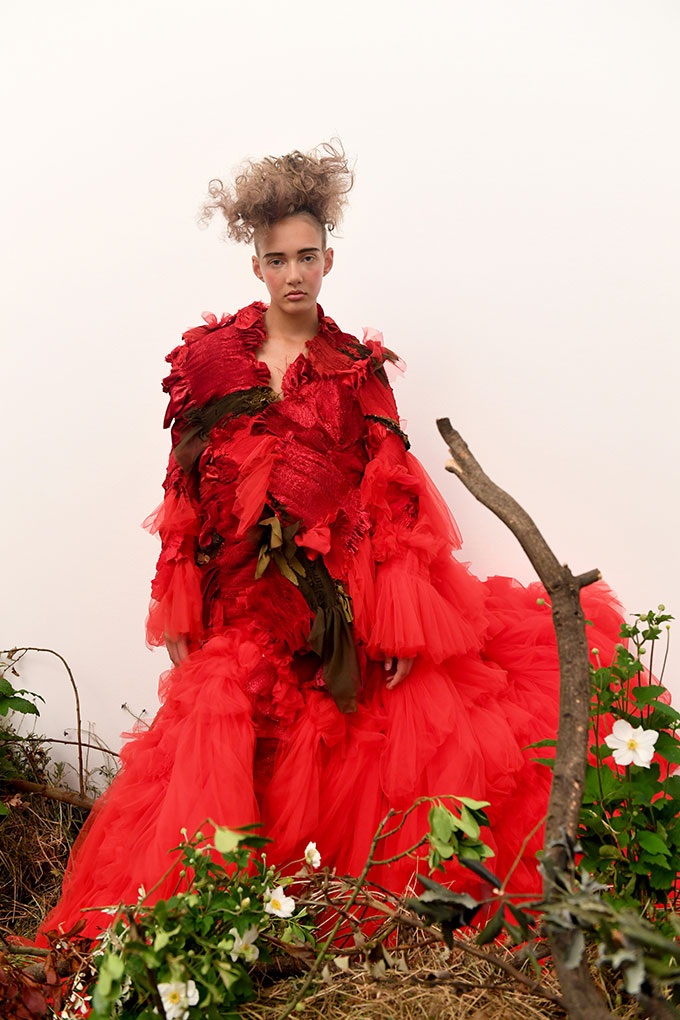Caroline Hu, the Shenzhen-born designer of the eponymous label, is happy to describe herself as a romantic in every sense of the word. Ever since she was a little girl, she remembers that she would insist on going to school in dresses and that her parents would buy Barbie dolls for her to play with.
“I am constantly trying to express romantic things in my work,” Hu explains of her aesthetic. To paraphrase Irish playwright Oscar Wilde, she says that “uncertainty is the nature of romance” and is what she is constantly trying to achieve in her designs. “Things that might move people to feel may not necessarily have a rule or reason to it. It has to be an unconscious moment. So, whether it’s in my textile designs or products, I hope that it produces that sense of uncertainty and that is what will make it romantic.”
This romantic tendency is evident in her work, which often draws on paintings for inspiration. For example, her autumn 2019 debut at New York Fashion Week was inspired by Henri Matisse’s 1894 painting ‘Woman Reading’, which was translated into effervescent gowns of tulle and silk, carefully constructed so as to give the impression of brushstrokes.

This artfulness, she explains, is due in part to her upbringing in China. She tells me of an art teacher that she had at a young age, who instructed her in various art forms such as oil painting and ceramics, and how to translate art in different ways. It was this artistic education that led her to pursue fashion design as a career.
Closer to home, she mentions that her father was an oil painter when she was a child, and although he later went on to become a businessman, his artistic endeavours left an impression on Hu as well. Despite this, she says that her family was initially against the idea of her decision to pursue fashion design. “I think this is very traditional Chinese thinking. They wanted me to be a teacher or to marry a good guy. They didn’t think that being an artist or a fashion designer was a good line of work for me,” Hu says. Overcoming familial objection, she continues, “needed a long time and for me to be very brave. They thought fashion design was a very challenging thing and they didn’t think it was good for a girl.”

Hu’s romantic nature had an influence on her education as well. She graduated from Central Saint Martins (CSM) with a bachelor’s degree in womenswear design, and later moved to New York to read her master’s degree at The New School’s Parsons School of Design. But the decision to study abroad in London and New York were less of a strategic move, but an emotional one, she tells me.
“I’m a very sensitive person, so I think I’m more influenced by my emotions or emotional experiences,” she says. “When I chose to study at CSM, at the time my boyfriend was in London, then he moved to America, and I followed him there as well, and we eventually got married there.” She laughs.
Upon graduating from Parsons, Hu went on to work for established American designers, among them Jason Wu and Tory Burch, where she focused on textile design. It was during her time working for these labels that Hu gained the insight to the industry she needed, and she quietly learned the ins and outs of the operational side of the fashion industry. Then, she decided to strike out on her own. “I felt that while I still have the passion and the capability, I wanted to do a brand with values and a design point of view.”

Since then, Hu has quickly gained the attention of the fashion industry. She won the inaugural Business of Fashion China Prize in 2019, where she triumphed over five other designers and won US$100,000, and an opportunity to showcase her spring/summer 2020 collection at London Fashion Week. Powerful fashion insiders such as Vogue China’s Angelica Cheung and top Chinese actor Hu Bing made it a point to show their support for Hu’s London presentation earlier this year, further cementing her as a rising Asian star in the fashion industry.
Hu is optimistic of the experience, and sees it as a sign that Chinese designers are at a pivotal moment in global fashion history. “Asian designers are increasingly becoming visible on a global scale, which I think is a good thing,” she says. “I think it’s the era that we’re in. Everyone is able to be recognised now because everyone is on the same platform.”
She goes on to explain, “For example, in the ’90s, when the Japanese fashion design scene was developing, the entire process took at least ten years. I feel that this may be the development period for Chinese designers, and it’s a very good starting point.”

Following her critical success, Hu has since moved her label to Shanghai, where she hopes to establish an operational base. This has proved difficult, she tells me, because the global COVID-19 pandemic has affected the local garment industry, with many factories insufficiently staffed or shuttered completely. Despite the challenges, she is working on a new collection that she hopes to show outside of the traditional fashion week circuit. “I think this time around I will hold an exhibition within China and use visual images or a video to launch my new collection,” she shares.
Looking to the future, Hu admits that being a fashion designer may not be the only career that she may explore. Her sensitive and creative nature may move her to delve into another industry, she muses. “I think I will not always want to be a fashion designer. Maybe after 40 or 50, I want to be a filmmaker. For me, all these things—the logic used in the arts—can be used in many different ways.”
For more stories like this, subscribe to the print edition of Vogue Singapore.





